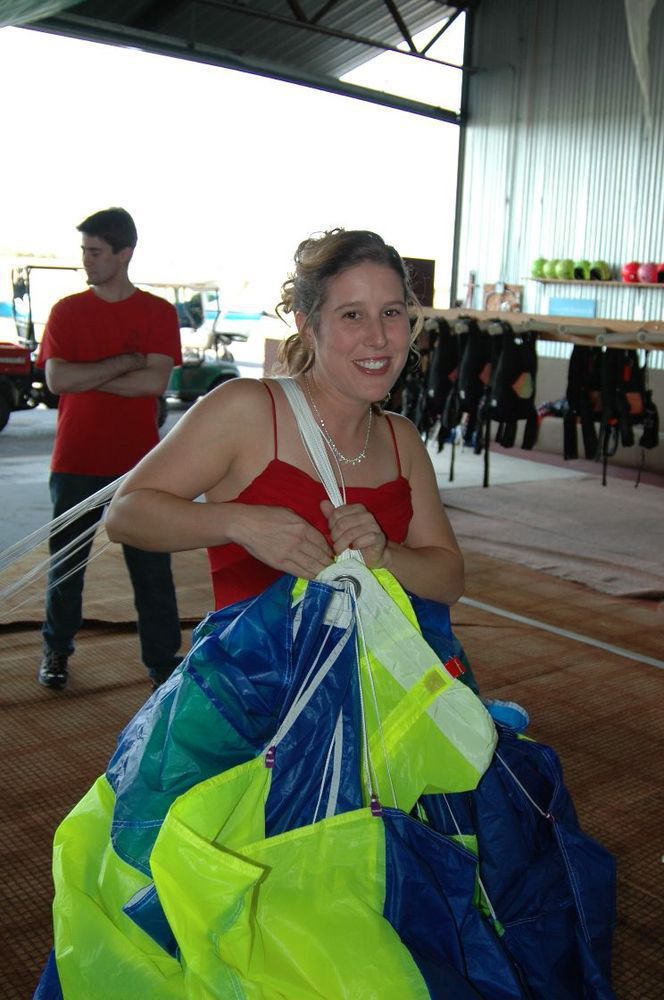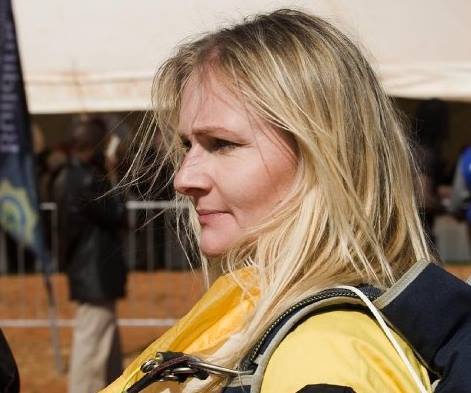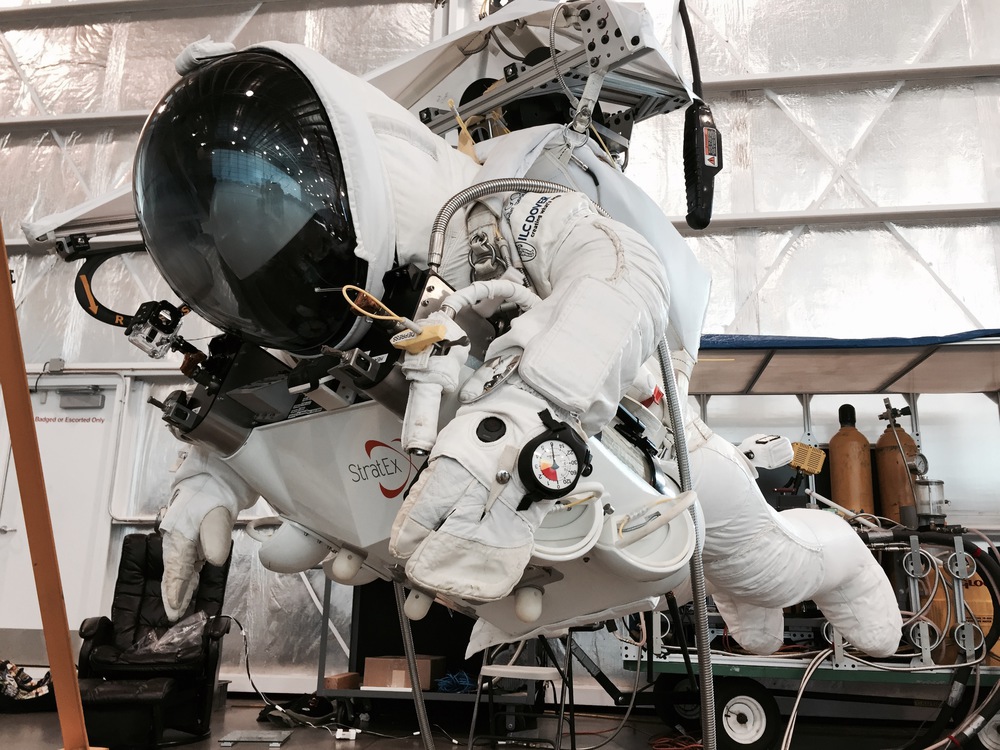Recommended Posts
koppel 3
Quotea difference in an AAD's firing altitudes based on their settings
Are there any people out there who, as a matter of course, set their AAD higher than its normal operational settings?
Answers on a postcard please...
...it lets me down.
Guest 1010

What has the student been told in the dirt dive or FJC? I was told that if my instructor pulls, I need to pull. Now. If I was down at 1500' with my instructor, among other things, I'd be confused. Must mean my altimeter is wrong. Who knows? Nothing unclear about seeing one or both of my instructors deploy their canopies, though.
NoShitThereIWas already said more than I could about AFFIs vs. coaches.
you seem to be of two minds yourself - you say:
QuoteQuotewhat situations would cause you if any to chase a student below 2000 ft.
If the student didn't have an open canopy. ...
but you also say:
QuoteQuoteBelow 2 grand, with modern AAD technology, their chances of survival are much higher if a zealous instructor, determined not to let one get away, does
n'tsave his own sorry ass.
You are probably right. Well, not probably, you are right.
Derek
In the above quote, with the reference to AAD technology, I first read it like I bolded it, and I think thats apoil meant - that the student is better off if the instructor dumps. I am unsure now, but think you are getting at the emotional-instinctual want to chase the student into the dirt, and "save" them, versus making the conscious decision to dump and leave them to their own devices and the AAD. I don't have kids yet, but if they were doing AFF, I'd want their instructor to dump.
You can have it good, fast, or cheap: pick two.
Beverly 1
The AFFI's are instructors for one. They jump with students. From level 1-10.
They are teaching the basic survival skills for skydiving.
A coach then takes the students onto an intermediate skills programme and then onto advanced body flight skills in a chosen discipline.
The coaches are not resposnible for pulling for a student. The student should already be advanced enough to have passed the AFF or SL programme.
Coaching is really just skills transfer for better skydiving.
A coach has to be a jumpmaster but not an instructor.
An instructor does not necessarily have to be a coach.
BUT : I have found chasing AFF students around the sky has drastically improved my flying skills enough for me to go for the AFF I course.
I think true friendship is under-rated
Twitter: @Dreamskygirlsa
Hooknswoop 19
QuoteAlthough I think I see the point you are trying to make, I do not agree with it if I am interpreting it correctly. First off, I don't consider my rating a "cracker-jack box rating". Those of us who have our AFF Instructor ratings had to demonstrate some pretty difficult tasks and go through what I consider a rigorous certification course. I feel a sense of honor and pride in having that rating. In my opinion, those who have been lucky enough to achieve it, had to do some pretty wild, daring and scary things to get it.
That was a jab at the new course, which it is a fact USPA lowered the standards to pass.
QuoteAs far as responsibility goes, it is not the job of a coach to make sure a student pulls.
So, is it the AFFI's responsibility to ensure the student pulls or pull for them?
QuoteAn AFF-I must have a D License and show the ability to "rescue" a student whether it be by deploying for them, flipping them over off their backs, controlling their exits to make them stable, stopping them from a spin, etc.
That used to be true, now you can get the AFFI rating w/o tha bility to catch an unstable student. I, and others have seen this happen.
QuoteAnd although most AFF-Is feel a sense of responsibility to make sure their students deploy on time and land safely, you will never convince me that it is our responsibility to break our own safety codes, i.e. going below our hard deck which is recommended for D license holders to be no lower than 2,000 feet.
I'm not talking about going below your hard deck, I'm talking about responsibility. By saying most AFFI's "feel a sense of responsibility to make sure their students deploy on time", implies, that 1) it isn't a requirement, and 2) some AFFI's do not feel that way.
Is it an AFFI's responsibility to ensure their student deploys or not? If an AFFI feels it isn't, then what is the difference between them and a Coach?
Derek
Hooknswoop 19
QuoteYou are not going to convince me it is wise for an instructor to chase a student down into AAD range.
I am not trying to. I am asking you what you think the differences in responsibility between a Coach and AFFI are,
Quoteyou seem to be of two minds yourself - you say:
Maybe, but when I was an AFFI/E I wouldn't have quit. It probably wouldn't have been the right thing to do, but that is what I would have done.
This isn't about hard decks, it is about responsibility.
What do you think the differences (if any) in responsibility they are between an AFFI and a Coach?
Derek
Guest 1010

I entered the thread in response to your question about how many students have gone in due to their instructor not being able to catch them (ie pull for them). My answer remains none, they should have pulled for themselves. Not the AFFIs fault they didn't arch like a m'fo and then pull.
After reading a little but not that much, I see more where you are coming from. I'm a few jumps off of student status. I have no opinion on any of that stuff.
However, there is information on this web site about things a person may wish to consider when choosing a dropzone where they learn to skydive. If a dz is populated with shoddy AFFIs, I'd pin that on poor dz management. I'd tend to think that other things about the dz would also be lacking, that are more clearly visible, than AFFI flying skills.
But in the end, for me, the student is responsible for themselves. Sure, I'll extend that responsibility to choosing a good dropzone. No one forces us to jump out of the aircraft. But I'm quite glad I did.
Blue Skies
You can have it good, fast, or cheap: pick two.
Hooknswoop 19
Derek
Guest 1010

QuoteWhat do you think the differences (if any) in responsibility they are between an AFFI and a Coach?
Derek
what Deuce said in the other thread:
QuoteIt's too big, Derek. Provoke it by asking if a specific situation you probably have in mind is a discipline's instructor's responsibility.
I'm responsible for everything from providing confidence to my student's parents to pulling him out below the hard deck, and we all look at the responsibilities differently. Heck, just a thread on responsibilities of instructors to families would probably catch fire. All our responsibilities would fill and encyclopedia.
I think the instructor's responsibility should be to provide the safest skydive they can to the student. That's why I asked you about the dissonance between what you say you will likely do and what you _should_ do when you've lost a student near 2000' in freefall.
Among the other thousand things, at a minimum, for an AFF skydive gone bad I think the AFFI is responsible for flipping the student onto their belly and pulling for them. That's what I'd want done with me if I needed it.
For a coach, among the other hundreds of things touched on by Beverly and others above, at a minimum, I want them to hold their spot in the air so I can see if I'm backsliding or not. That's it.
Those are what I consider the minimum responibilities of the two, and they are different. Now I am expecting you to rip on me for listing only those few things when in your opinion AFFIs should do and be so much more. Oh well. (FWIW I think the most junior AFFI I jumped with just cleared 1500 skydives; most times on the plane there were several people north 6k jumps. I have zero experience with low-experience AFFIs (or coaches) for that matter.)
So, I am curious, why is it important for you to know what I believe are the differences in responsibilities between AFFIs and coaches? I have no particular interest in becoming either at this time. I am a totally recreational jumper.
You can have it good, fast, or cheap: pick two.
skypuppy 1
It is my responsibility to see he lands safely, no matter who dumps for him. So I like the idea that if I got hit on the head on exit, or something else happened, he would know how to react and save himself.
That said, I would be following him down if he went low,
Bruce McConkey 'I thought we were gonna die, and I couldn't think of anyone
Quote
So, is it the AFFI's responsibility to ensure the student pulls or pull for them?QuoteYES. (Preferably at the correct altitude although the ultimate responsibility always lies with the individual who chooses to throw themselves out of a plane.)
***That used to be true, now you can get the AFFI rating w/o tha bility to catch an unstable student. I, and others have seen this happen.I'm not talking about going below your hard deck, I'm talking about responsibility. By saying most AFFI's "feel a sense of responsibility to make sure their students deploy on time", implies, that 1) it isn't a requirement, and 2) some AFFI's do not feel that way.QuoteREALLY? THAT IS A SHAME. I HAD TO DO ALL OF THAT AND I STILL THINK I COULD HAVE LEARNED MORE. I FEEL FORTUNATE TO HAVE DONE MY TRAINING COURSES WITH GLENN BANGS. HE WAS WHAT I CONSIDERED TO BE A FAIR, HEADS UP, KNOWLEDGEABLE COURSE DIRECTOR. I LEARNED A LOT FROM HIM AND MY OTHER EVALUATORS AND PRE-COURSE FRIENDS.
QuoteHere I think you are reading way too much into my words. I would hope that all AFF Instructors feel a sense of responsibility. However, no one should just assume ALL AFF Instructors do anything.
Is it a requirement? Well, yeah, I would think if you wanted to keep your job at the very least it would be a good thing if you haven't had student's with Cypres' firing or going in. I would also think it would be bad for one's reputation, feelings of self worth, ego, guilt complex, self esteem etc. in the sport. No one wants to have that on their conscience.
There is always a big HOWEVER though whenever we deal with a sport like skydiving. It is not your average, typical sport. It is considered extreme and you can die doing it. Therefore, people need to have personal limitations and a plan ahead of time for what they will do in an emergency.
I student still in freefall below 2,000 feet is an emergency and something apparently went very wrong on the skydive. I consider it my responsibility to do what I can to make sure my students are open at the correct altitude and land safely. At 2,000 feet they are taught if they see their instructors open, open themselves. My personal limitations in this sport are that by 2,500 feet I am under a good flying canopy. That limit may stretch to a minimum opening altitude of 2K to chase a student in need.
I feel that is my responsibility to myself, my student and my family.Roy Bacon: "Elvises, light your fires."
Sting: "Be yourself no matter what they say."




Derek,
Although I think I see the point you are trying to make, I do not agree with it if I am interpreting it correctly. First off, I don't consider my rating a "cracker-jack box rating". Those of us who have our AFF Instructor ratings had to demonstrate some pretty difficult tasks and go through what I consider a rigorous certification course. I feel a sense of honor and pride in having that rating. In my opinion, those who have been lucky enough to achieve it, had to do some pretty wild, daring and scary things to get it. Second, yes there is a considerable difference between a coach and an AFF-I. One difference would most definitely and hopefully be experience, another would be training, performance and level of difficulty to attain the AFF-I, and third would be responsibility which is the one I think you are honing in on.
As far as responsibility goes, it is not the job of a coach to make sure a student pulls. The student should already have demonstrated the ability to do that several times before being cleared to jump solo. If a student cannot deploy, they have no business graduating or being signed off to jump with a coach. The coach is there to teach and evaluate some basic skills which are helpful to beginner skydivers who are hoping to eventually jump with other jumpers. You only need 200 (which used to be 100) jumps to be a coach and train others to do those skills.
An AFF-I must have a D License and show the ability to "rescue" a student whether it be by deploying for them, flipping them over off their backs, controlling their exits to make them stable, stopping them from a spin, etc. This is a whole different ball game altogether. And although most AFF-Is feel a sense of responsibility to make sure their students deploy on time and land safely, you will never convince me that it is our responsibility to break our own safety codes, i.e. going below our hard deck which is recommended for D license holders to be no lower than 2,000 feet.
Sting: "Be yourself no matter what they say."
Share this post
Link to post
Share on other sites